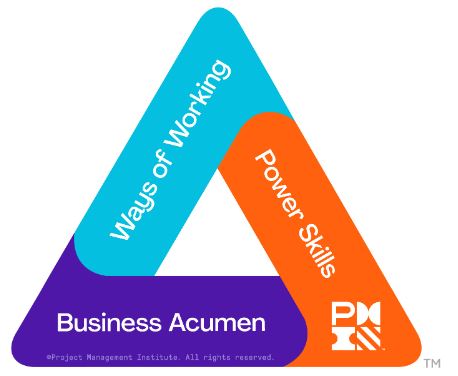Welcome to the PMO Strategies Podcast + Blog, where PMO leaders become IMPACT Drivers!

PMI Talent Triangle: Power Skills
Milestone birthdays tend to stir up reflection.
This year, I found myself thinking back to the moments that shaped my PMO journey. The mistakes I made, the patterns I fell into, and the friction I didn’t yet have the tools to remove.
So I pulled together 10 things I wish I had known sooner. Not just advice.
These are the mindset shifts, leadership principles, and operating system upgrades that would’ve saved me years of struggle.
If you’ve ever felt like you’re working too hard for too little recognition, these are for you.
1. Delivering projects isn’t enough. Delivering outcomes earns trust.
Finishing projects doesn’t build credibility. Finishing the right projects, with visible business results, does.
I spent years believing that if I hit my deadlines and managed risk well, people would see the value. But I was measuring success in activity while my executives were watching for IMPACT.
Outcomes over outputs isn’t a buzzword. It’s the unlock for trust, visibility, and executive support.
2. No one is going to ask you to lead. Start anyway.
If you’re waiting for someone to invite you into leadership, you’ll be waiting a long time.
I used to hold back, thinking leadership meant authority. It doesn’t. It means stepping up when others hesitate. Seeing the friction and choosing to do something about it.
The most credible leaders aren’t appointed. They’re visible because they solve real problems.
3. How you define your PMO is how others will use it.
If your PMO is known for templates and status updates, expect to be treated like a reporting function.
That’s what happened early in my career. I hadn’t yet defined the PMO as a strategic enabler, so no one else saw it that way either.
Design your PMO as a system that enables decision-making, accelerates delivery, and aligns strategy with execution. Then watch the perception change.
4. If your value isn’t obvious, it’s invisible.
People don’t see the hours. They see the outcomes.
You can work nonstop and still be overlooked if you’re not framing your value in business terms. This was one of the hardest lessons for me, realizing that effort doesn’t equal IMPACT unless it’s communicated in the right language.
Make your value easy to see and even easier to explain.
5. Every layer of friction reduces your influence.
Process isn’t neutral. It’s either creating flow or blocking it.
I’ve built systems that looked great on paper but fell apart in practice. Why? Because they slowed people down. When process feels like punishment, adoption vanishes.
The easier you make it to do the right thing, the more likely people are to do it. Simplify with purpose.
6. Strategy doesn’t break in planning. It breaks in delivery.
It’s easy to blame strategy when results stall. But most of the time, the problem isn’t the strategy. It’s the absence of a system that makes it executable.
Early in my career, I wasn’t thinking about delivery systems. I was focused on individual projects. Once I started designing how work moved, not just what work moved, outcomes improved across the board.
PMOs exist to operationalize strategy. Start there.
7. Resistance isn’t always about the change. It’s about the experience.
People don’t resist change. They resist confusion, disruption, and uncertainty.
I used to take pushback personally. Now I see it as signal. Resistance usually points to something broken in the way we’re introducing or supporting change.
Stand beside people. Walk with them. That’s where transformation happens.
8. If you’re not measuring business value, you’re measuring the wrong thing.
Executives don’t care about percent complete. They care about business results.
I learned this the hard way. I thought reporting timelines and budget variances showed progress. But none of that matters if the business outcome isn’t being met.
Shift your metrics. Start measuring what actually matters to your sponsors.
9. Control is overrated. Clarity is everything.
It’s tempting to try to control everything – scope, resources, decisions. But control doesn’t scale. Clarity does.
Once I stopped trying to grip every detail and instead focused on creating clarity around priorities, roles, and rhythms, momentum increased without extra effort.
The PMO isn’t there to own the work. It’s there to align it.
10. You don’t need to prove your worth every day. Build a system that shows it.
This was the big one. I spent years justifying my existence, defending headcount, and fighting for budget.
Then I realized I didn’t need louder messaging. I needed a better system. One that naturally revealed the business value being created through the work.
When your system is designed for visibility, your value stops being invisible.
These 10 lessons didn’t come from a book. They came from the field.
They came from failure, from missed moments, and from finally seeing the difference between being busy and being IMPACTful.
👉 Click play above to hear all 10 lessons, and learn how to lead with clarity, credibility, and a system that makes your value impossible to ignore.
P.S. It’s my birthday week, and I’m celebrating with something special just for you. 🎉 The full reveal drops publicly on my birthday—Thursday, July 10th—but newsletter subscribers get early access on Wednesday, July 9th. This exclusive offer will be available 24 hours before the release date, and quantities are limited, so be sure to subscribe and watch your inbox closely! 🎁
P.P.S. If you’ve already bought any version of The IMPACT Engine book previously, don’t forget to sign up for our Book Club. The IMPACT Insiders Book Club is so much more than reading a book — it’s a movement. Join us for live calls, deep conversations, and a behind-the-scenes look at how to create real change with The IMPACT Engine. It’s completely free — grab your seat now and don’t miss what’s next.
 Hey there, IMPACT Driver!
Hey there, IMPACT Driver!
Thanks for taking the time to check out our podcast and blog.
I welcome your feedback and insights!
I’d love to know what you think and if you love it, please leave a rating and review in your favorite podcast player.
You can also complete this survey to tell us more about you and get my advice on how to take your next steps toward high-IMPACT!
Warmly,
Laura Barnard









